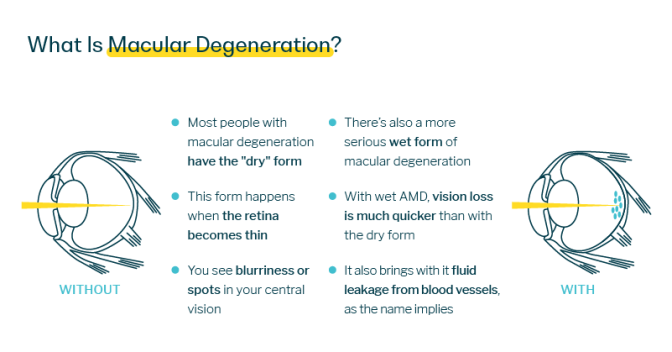50% OFF a Complete Pair of Glasses
*Restrictions apply. Click here for details.
What to Expect: Your Comprehensive Guide to Macular Degeneration Surgery
Macular degeneration is a common age-related eye condition that gradually damages the macula, the central portion of the retina responsible for sharp, detailed vision. As it progresses, people often notice their central vision growing increasingly blurry or distorted, making daily tasks like reading, driving, or recognizing faces more difficult. Although macular degeneration cannot be cured, there are surgical and non-surgical treatments available that can slow or prevent further vision loss.
One proven treatment involves laser surgery, a technique used to stabilize damage in specific cases of macular degeneration. While not everyone will require or benefit from laser therapy, understanding your treatment options is an important first step in managing the disease and maintaining the best possible vision. To learn more about the types of macular degeneration and how you can slow their progression, continue reading Clarkson Eyecare’s guide to macular degeneration and macular degeneration surgery.
The Two Types of Macular Degeneration

Macular degeneration is associated with age-related changes in the retina, specifically within the macula. In most cases, these changes occur gradually, but they can significantly impact your ability to see fine details over time. Age-related macular degeneration (AMD) typically presents in two forms: dry age-related macular degeneration (dry AMD) and wet age-related macular degeneration (wet AMD). Understanding the differences between these forms is crucial for recognizing early symptoms and seeking proper treatment.
Dry AMD
Although there is currently no cure for dry AMD, research has shown that certain nutraceuticals supplements can be used to slow its progression. These supplements typically contain antioxidants, zinc, lutein, and zeaxanthin. Healthy habits like eating a balanced diet, avoiding smoking, and protecting your eyes from UV light can also play a role in managing dry AMD.
Wet AMD
Medications and surgery can be used to slow the progression of the wet form. These include, but are not limited to:
Medications that slow the growth of blood vessels, such as anti-vascular endothelial growth factor (VEGF) drugs².
Photodynamic therapy, which uses intravenous medication and a non-thermal laser treatment to destroy abnormal blood vessels
A non-thermal laser surgery called laser photocoagulation³ to burn away and prevent further growth of abnormal blood vessels
Treatment Options for Macular Degeneration
While the treatment options available depend on which type of macular degeneration you’re diagnosed with, the best way to preserve your central vision is for prompt diagnosis. If you experience sudden or noticeable changes in central vision like distortion, blurriness, or dark spots, contact your Clarkson Eyecare optometrist immediately.
Wet AMD
Medications and surgery can be used to slow the progression of the wet form. These include, but are not limited to:
Medications that slow the growth of blood vessels, such as anti-vascular endothelial growth factor (VEGF) drugs².
Photodynamic therapy, which uses intravenous medication and a non-thermal laser treatment to destroy abnormal blood vessels
A non-thermal laser surgery called laser photocoagulation³ to burn away and prevent further growth of abnormal blood vessels
Dry AMD
Although there is currently no cure for dry AMD, research has shown that certain nutraceuticals supplements can be used to slow its progression. These supplements typically contain antioxidants, zinc, lutein, and zeaxanthin. Healthy habits like eating a balanced diet, avoiding smoking, and protecting your eyes from UV light can also play a role in managing dry AMD.
Undergoing Macular Degeneration Surgery
Laser photocoagulation surgery can help prevent total vision loss in the long term. However, the scarring it causes may create a blind spot that adds to your current vision loss. Your doctor will talk to you about the risks of the procedure and whether it'll be beneficial to you. Macular degeneration surgery is usually more helpful for people whose abnormal blood vessels are clustered close together and may not help those with scattered vessel formation. Here’s what you can expect from macular degeneration surgery:
Preparing for Surgery
Before you consider surgery, you should discuss all treatment options with your eye doctor. As with any surgery, there are risks to laser photocoagulation, including additional vision loss. You may want to try treating with medications before considering surgery. If you do make the decision to move forward with surgery, there isn't much you need to do to prepare. During the procedure, your eyes will be dilated with special eye drops. You will need to arrange for someone to drive you to and from the procedure.
During Surgery
When you arrive for your surgery, you will be seated for treatment. The doctor will then dilate your eyes with eye drops and may use a local anesthetic or numbing drops. Once your doctor is ready to begin the surgery, you will position your face on a chin rest. A special lens will be placed in front of your eye to help your doctor focus on the treatment area. You will be asked to focus straight ahead or at another light.
Your doctor will then direct a laser at the affected areas to seal off leaking blood vessels. With each pulse of the laser, a small flash of light will be visible. The number of pulses used will depend on the severity of your condition. In all, the entire procedure should only take about 30 minutes.
Recovering from Macular Degeneration Surgery
After surgery, your doctor may cover your eye with a patch or bandage. Your eyes will remain dilated for a few hours after the procedure, and you may experience blurred vision for a day or so after your surgery. It is also possible to have floaters that will resolve in time. Your doctor will provide you with instructions about how long to keep your eye covered, what medications you can take for discomfort, and when to return for follow-up visits. Keep in mind that your vision will be blurred for at least a day after surgery.
Neither laser photocoagulation nor other procedures can cure macular degeneration, nor can they reverse the damage that has already been done. The goal of macular degeneration treatments—including surgery—is to reduce the risk of additional damage and vision loss.
Explore Your Macular Degeneration Options at Clarkson Eyecare

Think you may need macular degeneration surgery? Find a Clarkson Eyecare location near you to schedule an appointment. Our team of highly trained eye care professionals provide comprehensive eye care including routine eye exams, preventative care, and treatment.
